Norman Newell was an English record producer, who was mainly active in the 1950s and 1960s. He was also the co-writer of many notable songs. As an A&R manager for EMI, he worked with musicians such as Shirley Bassey, Dalida, Claude François, Vera Lynn, Russ Conway, Bette Midler, Judy Garland, Petula Clark, Jake Thackray, Malcolm Roberts, Bobby Crush and Peter and Gordon.

Get the Party Started is a 2007 album by Welsh singer Dame Shirley Bassey.
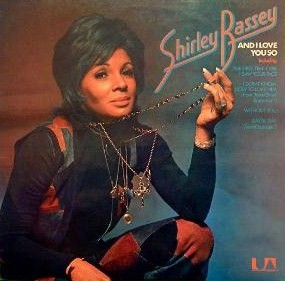
And I Love You So is a 1972 album by Shirley Bassey.

The Shirley Bassey Singles Album is a compilation album released in 1975 by British singer Shirley Bassey.

Let's Face the Music is the sixth Shirley Bassey studio album, released in 1962, and arranged by Nelson Riddle. Kenneth Hume, Shirley Bassey's husband and manager wrote the sleeve notes for this album, in which he gives an insight into how this album came to being: "When Vic Lewis booked Nelson Riddle for a tour with Shirley, we were all very excited; being great fans of Nelson Riddle's from way back...so when someone suggested them doing an LP together, we thought that this would not be possible, remembering that Nelson was under contract with another recording company." Nelson Riddle was under contract to Capitol Records at the time, so Bassey's producer Norman Newell went about to secure his services for an album. While on the tour, Bassey, Riddle, and Bassey's music director Raymond Long discussed what form the album should take. Shortly after the tour was completed, the recording sessions began.

The Fabulous Shirley Bassey is the third studio album by Welsh singer Shirley Bassey, and her first for Columbia Records. It was recorded with Geoff Love and his orchestra, and peaked at #12 in the UK album chart in early 1961. Released in 1959, this was the first studio album from Shirley Bassey with completely new material. Her two previous albums issued on the Philips label were collections of new recordings and previously released material, recorded between 1956 and 1958.

Live in Japan is a double album by Shirley Bassey, recorded July 8, 1974 at Kosei-Nenkin Kaikan Hall in Tokyo, Japan. The album was released in Japan only, and the reverse of the cover listed the songs in English and Japanese. Live at Carnegie Hall had been released just a year prior, with nine of the same songs from Live in Japan, and it is believed that this is at least partly the reason Live in Japan didn't gain a worldwide release. Japan was an important growing market for many artists in the 1970s and many recorded live albums exclusively for release in Japan.
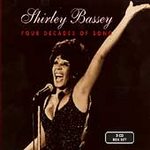
Four Decades of Song is a three-CD compilation from Shirley Bassey issued in 1996. This set features 54 songs recorded between 1959 and 1993. In 2008 EMI repackaged and retitled this boxset as Shirley Bassey The Collection; the new version had six extra tracks.

Bassey – The EMI/UA Years 1959–1979 is a 5-CD boxset compilation from Shirley Bassey issued in 1994, this set features 94 studio recordings on four CDs, recorded for EMI/United Artists between 1959 and 1979. Disc five features a previously unreleased live recording from Carnegie Hall. The boxset was reissued by EMI in 2010 in a standard jewel case set.

All by Myself is a 1982 album by Shirley Bassey. Having ended her contract with United Artists around 1980, Bassey took a break from recording, and then began releasing albums on various labels. All by Myself was the first of these, issued on the Applause label. 1982 was the dawn of the CD era, and this was her first-ever album to be issued on CD. The album was also issued on LP and cassette. In the UK and some other countries, the album was titled Love Songs, with identical cover art, and under that name it charted for five weeks on the UK albums chart, on the K-tel label, peaking at #48. The original CD has since become scarce, though the songs have appeared on many compilations.

I've Got a Song for You is a 1966 album by Shirley Bassey. Bassey had left EMI's Columbia Label, and this was her first album for United Artists, a label she would remain with for approximately 14 years. This album and the following release And We Were Lovers were produced by Bassey's former husband, Kenneth Hume. The album entered the UK Albums Chart at #26, but only remained on the chart for one week, and failed to chart in the US, despite her having received outstanding reviews for live engagements in New York and Las Vegas that same year, and the fact that the album was recorded in New York. It was an inauspicious start for her at UA, as none of her albums would chart either in the UK or the US until 1970. In that year, 1970, Bassey would begin to produce more contemporary pop-oriented albums, but here in 1966, despite scoring her biggest hit with "Goldfinger" a year or so earlier, she was still firmly in the traditional pop genre.

Keep the Music Playing is a 1991 album by Shirley Bassey. The album was recorded in the UK at the Westgreen Studios and in the Netherlands at Wisseloord Studios, Hilversum. The album is a mixture of contemporary pop ballads, such as "I Want to Know What Love Is" from Foreigner, the Jennifer Rush power ballad "The Power of Love", and the more gentle "Still" from Lionel Richie, combined with standards from the field of jazz and pop, such as "He Was Beautiful", the sweet jazz ballad from Cleo Laine. Several of the song arrangements reflect an operatic pop style influence, which may have roots in her 1984 album I Am What I Am, which she recorded with the London Symphony Orchestra, and the fact that in the latter mid-1980s she started working with a vocal coach, a former opera singer. Bassey returned to the Beatles with "Yesterday", as she had previously covered "Something" and "Fool on the Hill" successfully in the 1970s, and had performed "Hey Jude" frequently live. Another previously successful formula was used for the closing track "Dio, Come Ti Amo " an Italian original in the tradition of "This is My Life" and "Natalie"..
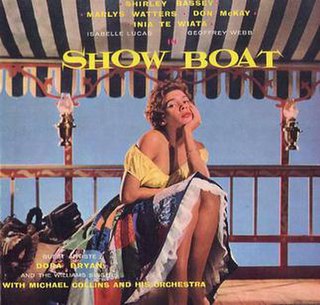
Show Boat is a studio recording of the 1927 musical Show Boat by Jerome Kern and Oscar Hammerstein II. The album was recorded in the summer of 1959 at the No.1 studio, Abbey Road, London, and issued by the 'His Master's Voice' label, a subsidiary of EMI, which was run at this time by Norman Newell. It features a cast that was formed for this recording only; this cast did not perform the show live in any theatre production.
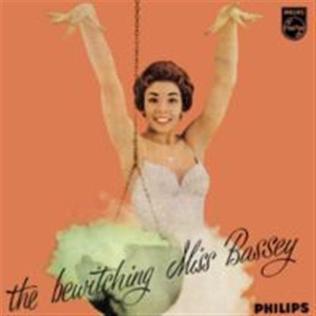
The Bewitching Miss Bassey is the second studio album by Welsh singer Shirley Bassey. Consisting of new and previously released material, this was the first album by Bassey to be issued on the 12" Long-playing record format. Tracks were taken from sessions recorded between 1956 and early 1959. All the songs were recorded in the UK with Wally Stott and his Orchestra, with production by Johnny Franz. The only exception was "The Wall" which was recorded in New York with Jimmy Carroll and his orchestra and produced by Mitch Miller. Featuring Bassey's first five hit songs, including Bassey's 1958 number one single "As I Love You" and the huge hit "Kiss Me, Honey Honey, Kiss Me". The album showcases the best of the early career of Shirley Bassey. All the songs were only recorded in mono, no stereo versions are known to exist. In the 1970s Philips did re-issue them in an "electronically enhanced" stereo. The album was re-issued in the US on the Epic label with different artwork. While this album has not been issued independently on CD, it was included in its entirety on the four-CD compilation titled Five Classic Albums Plus Bonus Singles in 2012.
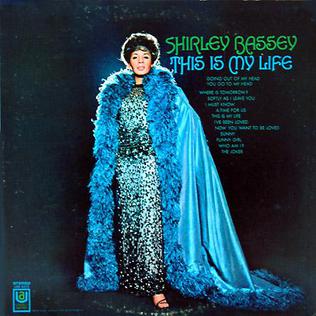
This Is My Life is a 1968 album by Shirley Bassey. The mid to late sixties was a period of declining popularity for traditional pop. How much the changing tastes in popular music directly affected Bassey's record sales is difficult to quantify; but her record sales had been faltering since the latter part of the mid 1960s, and the album failed to chart(She did have some success in Italy during this period, where she recorded several songs in Italian, with two making the Top 40 there).

The Shirley Bassey Collection is a double compilation album released in 1972 by British singer Shirley Bassey. The album charted at #37 in the UK charts in January 1972.

Love, Life and Feelings is the 21st studio album from Shirley Bassey, released in 1976 on the United Artists label. The album peaked at #13 in the UK album chart, and charted at #149 in the Billboard 200. Love, Life and Feelings was awarded silver record status by the British Phonographic Industry, with sales of more than 60,000 copies. Features covers of contemporary pop songs from the late 1960s and early 1970s, such as "Alone Again (Naturally)" the 1972 UK #3 single from Gilbert O'Sullivan and "The Way I Want to Touch You" from Captain & Tennille alongside "What I Did for Love", from the musical A Chorus Line written by Marvin Hamlisch.
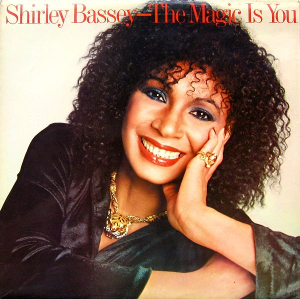
The Magic Is You is a 1979 album by Welsh singer Shirley Bassey. Her final album for United Artists Records, the album notably featured a disco version of her signature 1968 song "This Is My Life".
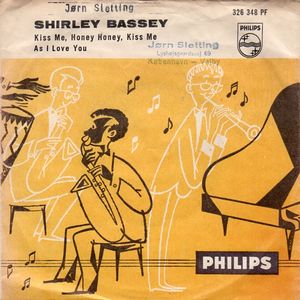
"Kiss Me, Honey Honey, Kiss Me" is a popular song written by Michael Julien and Al Timothy. It was first recorded by Welsh singer Shirley Bassey and released as a single in 1958 to commercial success. The song was then included on Bassey's album The Bewitching Miss Bassey (1959) and would become one of her most recognisable tunes. It has since been covered by numerous artists.

25th Anniversary Album is a compilation album by Shirley Bassey. Released in 1978 to mark her 25th year in show business, the album was a double set, comprising 40 tracks. The songs included span just 20 of the 25 years from 1957 to 1976, however, her first professional contract is dated 1953. Bassey had toured extensively throughout 1978 to mark her 25 years. This collection, including her biggest hits and some lesser-known recordings, became one of her biggest in the UK, where it reached No.3 and spent 12 weeks on the album chart.



















